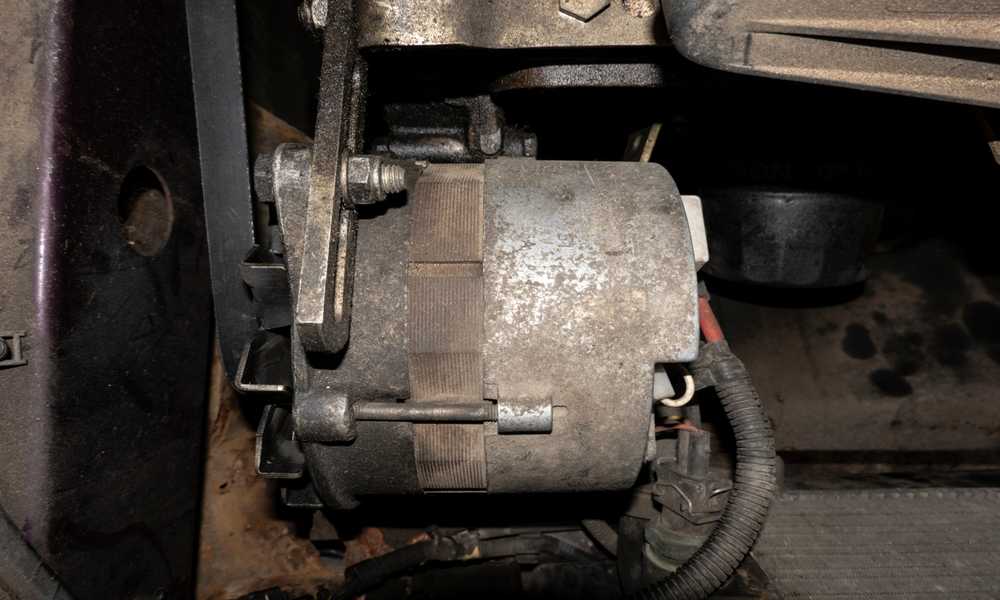Keep your alternator running smoothly and efficiently with regular cleaning. If you’ve noticed a decrease in performance or an increase in noise coming from your vehicle’s electrical system, it may be time to give your alternator some TLC. Cleaning the alternator without removing it may seem like a daunting task, but fear not! In this blog post, we’ll guide you through the process step by step, ensuring that you can keep your alternator in top shape without breaking a sweat. So let’s dive in and learn how to clean alternator without removing!
What can I use to clean alternator?
When it comes to cleaning your alternator, you want to make sure you’re using the right products. Luckily, there are a few options that work well for this task. One popular choice is electrical contact cleaner. This specialized cleaner is designed to remove dirt, grease, and other contaminants from electrical components without leaving any residue behind. Another option is rubbing alcohol or isopropyl alcohol. It’s a commonly used solvent that can effectively clean the surface of your alternator. Just be sure not to use too much liquid and avoid getting it into sensitive areas like the bearings or brushes.
If you prefer a more natural approach, white vinegar can also do wonders in cleaning your alternator. Its acidic properties help break down grime and dirt while being gentle on the delicate parts of the alternator. Compressed air can be incredibly useful in blowing away loose debris and dust from your alternator’s surface. Remember to use short bursts of air instead of continuous pressure to prevent damage. Now that you know what products you can use let’s move on to how to safely clean an alternator!
How to safely clean an alternator?
When it comes to cleaning an alternator, safety should always be a top priority. Here are some steps you can take to safely clean your alternator without causing any damage. Make sure the engine is turned off and cool before attempting to clean the alternator. This will prevent any accidents or injuries from occurring. Next, use a soft brush or cloth to gently remove any loose dirt or debris from the surface of the alternator. Be careful not to apply too much pressure as this can cause damage.
If there are stubborn stains or grease on the alternator, you can use a mild degreaser specifically designed for automotive parts. Apply the degreaser onto a cloth and then carefully wipe down the affected areas of the alternator. Avoid spraying any liquid directly onto the alternator as this can lead to electrical damage. Instead, dampen a cloth with water or cleaner and use it to wipe away grime.
Remember that prevention is key when it comes to keeping your alternator clean. Regular maintenance and inspections can help identify potential issues early on and prevent them from becoming major problems down the line. By following these tips, you can safely clean your alternator without having to remove it from your vehicle.
Is it safe to wash the alternator?
This is a common question among car owners who want to keep their engine components clean and functioning optimally. The answer depends on how you approach the cleaning process. It’s important to note that the alternator is an electrical component and therefore requires extra care when cleaning. It’s generally not recommended to directly spray water or any other liquid onto the alternator as this can potentially damage its sensitive internal parts.
Instead, a safer method is to use compressed air or a soft brush to gently remove any dust or debris from the surface of the alternator. Be sure to exercise caution and avoid applying excessive force or using abrasive materials that could scratch or cause damage. If you notice grease or oil buildup on your alternator, it may be necessary to use a degreaser specifically formulated for electrical components. However, always follow the manufacturer’s instructions and take proper precautions such as covering nearby electrical connections with plastic wrap before applying any cleaner. While washing an alternator directly with water is not advised, there are safe methods for keeping it clean. By utilizing gentle techniques and appropriate products, you can maintain your alternator without risking damage to its delicate components.
How to deep clean a dirty alternator?

A dirty alternator can compromise the performance and efficiency of your vehicle’s electrical system. To ensure optimal functioning, it is important to deep clean a dirty alternator regularly. Start by disconnecting the battery to avoid any electrical shocks. Next, use a soft-bristle brush or an old toothbrush to gently remove loose dirt and debris from the surface of the alternator. Be careful not to scrub too hard as this could damage delicate components.
After removing loose dirt, you can use compressed air or a vacuum cleaner with a narrow attachment nozzle to blow away or suck up any remaining particles from hard-to-reach areas. This will help ensure that no debris is left behind. For more stubborn grime and grease buildup, you can use an electrical parts cleaner or degreaser specifically designed for automotive use. Spray the cleaner onto a lint-free cloth and carefully wipe down all surfaces of the alternator, including fins and cooling vents if applicable.
Once you have thoroughly cleaned the alternator, allow it ample time to dry before reconnecting the battery. It is crucial to ensure that there is no moisture present when reassembling your vehicle’s electrical system. Regular deep cleaning of your dirty alternator will not only enhance its longevity but also contribute towards maintaining optimal performance levels in your vehicle’s overall electrical system. So don’t neglect this important maintenance task!
How to clean alternator without removing It?
When it comes to cleaning an alternator without removing it, there are a few methods you can try. One option is using compressed air to blow away any dust or debris that may have accumulated on the surface of the alternator. This can be particularly effective in removing loose particles without causing any damage. Another technique involves using a soft brush or toothbrush to gently scrub the exterior of the alternator. Be careful not to apply too much pressure as you don’t want to risk damaging any delicate components. A gentle touch is key here.
If you notice stubborn dirt or grime on your alternator, you can use a mixture of warm water and mild detergent. Dampen a cloth with this solution and carefully wipe down the surface, taking care not to let any liquid seep into the inner workings of the alternator. For tougher stains or grease buildup, some people find success by using electrical contact cleaner. This type of cleaner is specifically designed for use on electrical components and evaporates quickly after application, minimizing any potential harm. Remember, always exercise caution when working near electrical systems and avoid spraying liquids directly onto sensitive areas such as connectors or wires. Taking these precautions will help ensure both your safety and that of your vehicle’s electrical system.
How often should I clean my alternator?
This is a commonly asked question among car owners who want to ensure the longevity and proper functioning of their vehicle’s electrical system. While there is no definitive answer that applies to every situation, it is generally recommended to clean your alternator at least once a year or whenever you notice any signs of dirt or buildup. Regular cleaning helps prevent dust, debris, and oil from accumulating on the surface of the alternator. Over time, these contaminants can hinder its performance and even lead to corrosion if left untreated. By keeping your alternator free from dirt and grime, you can maintain optimal charging efficiency and reduce the risk of potential issues down the road.
It’s important to note that certain factors may require more frequent cleaning. If you frequently drive in dusty or dirty environments or if your vehicle has an oil leak near the alternator, it may be necessary to clean it more often. Additionally, if you notice any symptoms such as dimming headlights or difficulty starting your car, it could indicate a dirty alternator that needs attention. In conclusion (not conclusive), regular cleaning of your alternator is essential for maintaining its performance and prolonging its lifespan. By following a yearly cleaning routine or addressing any signs of buildup promptly, you can ensure that this critical component stays in optimal condition for years to come!
Can you use brake cleaner on an alternator?
Using brake cleaner on an alternator is not recommended. While it may be tempting to use this common automotive cleaning product, it can actually cause more harm than good. Brake cleaners typically contain harsh chemicals that are designed to dissolve grease and oil from brake components. However, these chemicals can be too abrasive for the delicate electrical components inside an alternator. They can strip away protective coatings and damage sensitive wiring, leading to malfunctions or even complete failure of the alternator.
Instead of using brake cleaner, it’s best to opt for a specialized electrical contact cleaner or degreaser specifically formulated for use on sensitive electronic parts. These cleaners are gentler and won’t pose a risk of damaging your alternator. When cleaning your alternator, always follow manufacturer guidelines and recommendations. Disconnect the battery before starting any cleaning process to avoid potential electrical shocks or short circuits. While brake cleaner may work well for other automotive applications, it is not suitable for cleaning an alternator due to its potentially harmful effects on the delicate electrical components inside. Stick with products specifically designed for electronic parts when maintaining your alternator’s cleanliness and functionality.
Can I spray WD40 on my alternator?

When it comes to cleaning your alternator, using WD40 might seem like a convenient option. After all, this multi-purpose lubricant is known for its ability to loosen rusted parts and remove moisture. However, spraying WD40 directly onto your alternator may not be the best idea. WD40 is primarily designed as a lubricant and water displacer rather than a cleaner. While it can help prevent corrosion and improve electrical conductivity on metal surfaces, it may not effectively remove dirt or grime from your alternator.
Moreover, applying an excessive amount of WD40 can potentially lead to more harm than good. The excess residue left behind by the spray can attract dust and debris over time, causing clogs in the cooling fins or other critical components of the alternator. Instead of solely relying on WD40 for cleaning purposes, consider using specialized electrical contact cleaner or mild soapy water with a soft brush or cloth. These options are generally safer and more effective at removing dirt without leaving behind harmful residues. Remember that prevention is key when it comes to maintaining an efficient and clean alternator. Regular maintenance checks coupled with proper cleaning techniques will ensure optimal performance and extend the lifespan of your alternator.
Can you spray an alternator with water?
This is a common question that many people have when it comes to cleaning their alternator. The short answer is yes, you can spray water on your alternator, but there are some important things to keep in mind. First and foremost, it’s crucial to ensure that the engine is off before attempting to clean the alternator. Water and electricity do not mix well, so taking this precautionary step will help prevent any potential accidents or damage.
When spraying water on the alternator, be mindful of where you aim the stream. It’s best to avoid spraying directly onto electrical connectors or sensitive components. Instead, focus on areas where dirt and debris may have accumulated. Using a gentle stream of water from a hose or pressure washer can effectively remove surface grime and dirt from the alternator housing. However, it’s important not to use excessive force as this could potentially dislodge wiring connections or cause other damage.
After rinsing off any excess dirt and debris with water, allow the alternator to thoroughly dry before starting the engine again. Moisture can lead to corrosion if left unchecked. While it is possible to spray an alternator with water for cleaning purposes, caution should be exercised. Always remember to turn off the engine beforehand and avoid spraying directly onto electrical components. By following these guidelines, you can safely clean your alternator without removing it!
Can you clean an alternator with degreaser?
Cleaning an alternator can help improve its performance and prolong its lifespan. One popular option for cleaning is to use a degreaser. But can you clean an alternator with degreaser? The answer is yes! Degreasers are designed to remove grease, grime, and other contaminants from surfaces, making them ideal for cleaning alternators. However, it’s important to choose the right type of degreaser. When using a degreaser on your alternator, opt for one that is specifically formulated for electrical components. These types of degreasers are non-conductive and safe to use on sensitive parts like the alternator. To clean your alternator with a degreaser, start by disconnecting the battery to prevent any accidental electrical shocks. Then, spray the degreaser onto a cloth or brush and gently wipe down the exterior surfaces of the alternator.
Be cautious not to spray directly onto any electrical connections or wiring as this could cause damage. Instead, focus on removing dirt and grime from accessible areas. After cleaning with the degreaser, use another clean cloth or brush dampened with water to remove any residue left behind by the cleaner. This will ensure that all traces of grease and dirt are completely removed. Remember to always follow manufacturer instructions when using any cleaning products on your vehicle’s electrical components. And if you’re unsure about how to properly clean your specific model of car’s alternator without removing it, it’s best to consult a professional mechanic for guidance. Yes – you can clean an alternator with a specialized electrical component degreaser! Just be sure to take necessary precautions such as disconnecting the battery before starting and avoid spraying directly onto sensitive areas like wiring connections.
What happens if oil gets on alternator?
The alternator plays a crucial role in your vehicle’s electrical system, and any contamination can have serious consequences. So, what happens if oil gets on the alternator? Let’s find out. Oil is an insulator and not a conductor like electricity. When oil comes into contact with the different components of the alternator, including brushes and coils, it can interfere with their ability to conduct electricity effectively. This interference can lead to reduced power output or even complete failure of the alternator.
Additionally, oil is also a lubricant that helps reduce friction between moving parts. However, when it gets on the surfaces where it shouldn’t be, such as the pulley or rotor shaft of the alternator, it can cause slippage and affect its performance. Furthermore, oil can attract dirt and debris which may accumulate on the surface of the alternator over time. This buildup can restrict airflow around the unit and result in overheating issues.
In conclusion (remember not to use this phrase), if you notice any signs of oil leakage onto your alternator – such as unusual noises or dimming lights – it’s essential to take immediate action. Clean any excess oil carefully using appropriate methods while ensuring not to damage sensitive components. Regular maintenance checks will help prevent these issues from occurring in the first place.
How do you clean an oily alternator?

When it comes to cleaning an oily alternator, there are a few steps you can take to effectively remove the oil buildup without having to remove the entire unit. First, make sure that the engine is turned off and has cooled down before beginning any cleaning process. Safety should always be a priority when working with electrical components. Next, cover nearby electrical connections and sensitive parts with plastic bags or tape to protect them from moisture or cleaning agents. Using a lint-free cloth or sponge, gently wipe away as much of the excess oil as possible. Be careful not to apply too much pressure or scrub vigorously, as this could damage delicate components.
To further clean the oily residue, use a degreaser specifically designed for electrical components. Apply the degreaser onto a clean cloth and carefully wipe down all surfaces of the alternator. Take care not to let any liquid penetrate into openings or exposed wiring. Once done with degreasing, allow sufficient time for drying before reconnecting any electrical connections and starting up your vehicle again. Regular maintenance is key in preventing excessive oil buildup on your alternator. By keeping your engine properly tuned and inspecting for leaks regularly, you can minimize the need for extensive cleaning in the future. Remember that if you are unsure about how to properly clean an oily alternator yourself, it is always best to consult with a professional mechanic who can provide guidance specific to your vehicle’s make and model.
Final thoughts
Cleaning an alternator without removing it is a straightforward process that can help improve its performance and longevity. By following the steps outlined in this article, you can effectively remove dirt, debris, and oil buildup from your alternator. Remember to clean your alternator regularly to prevent any potential issues caused by contamination. While there isn’t a specific timeframe for how often you should clean it, doing so as part of your regular maintenance routine is recommended.
When cleaning your alternator, avoid using brake cleaner or WD40 as they may damage the electrical components. Instead, opt for a mild degreaser or electrical contact cleaner that is safe for use on sensitive parts. If oil gets on your alternator, it’s important to address the issue promptly. Remove any excess oil with a cloth and then use an appropriate cleaning solution to thoroughly clean the affected areas. In conclusion (without explicitly stating), taking care of your alternator through regular cleaning will not only enhance its performance but also prolong its lifespan. So don’t neglect this essential part of your vehicle’s electrical system – keep it clean and enjoy reliable power generation!



